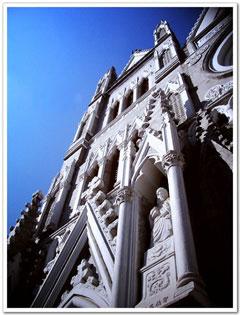Traditionally Chinese have had a pragmatic view towards religions. When you are in a Chinese temple and see people praying, you can be fairly sure they are asking the gods for benefits such as wealth, health and the birth of a son. Probably, that is one of the reasons why there has not been a state religion in China since ancient times.
 The main religions are Confucianism, Buddhism, Taoism, Islam and Christianity.
The main religions are Confucianism, Buddhism, Taoism, Islam and Christianity.
Confucianism
Confucianism is the most wide-spread system of religious thought in China. It originated from the teachings of Confucius and his disciples, and is concerned with the principles of good conduct, practical wisdom, and proper social relationships. The founder, Confucius, is respected not only as a great man, but also a god whose thoughts shaped Chinese attitudes toward life, set the patterns for living and standards of social value.
His teachings provided the background for Chinese political theories and institutions. It has greatly influenced other Asian countries like Korea, Japan, and Vietnam.
Buddhism
 Buddhism has a history of 2,000 years in China. The teachings of Buddha arrived in China along the Silk Road in 67 BC. Over time, Buddhism gradually became rooted in ancient China, intermingling with Confucianism and Taoism to become an important part of the intellectual life. It had a strong appeal and its ideas made a notable impact on almost every aspect of Chinese society. Buddhism in China is classified as Mahayana Sect (the Great Vehicle) that is widely accepted by people all over Mainland China and Tibet, who adhere to Zen and Tibetan Buddhism respectively.
Buddhism has a history of 2,000 years in China. The teachings of Buddha arrived in China along the Silk Road in 67 BC. Over time, Buddhism gradually became rooted in ancient China, intermingling with Confucianism and Taoism to become an important part of the intellectual life. It had a strong appeal and its ideas made a notable impact on almost every aspect of Chinese society. Buddhism in China is classified as Mahayana Sect (the Great Vehicle) that is widely accepted by people all over Mainland China and Tibet, who adhere to Zen and Tibetan Buddhism respectively.
 Taoism
Taoism
Taoism is native to China, and has a history of more than 1,700 years. Derived from ancient nature worship, Daoism was promoted by Lao Zi, a philosopher living around the 6th century BC. He embraced the principles of Yin and Yang and added a spiritual dimension of immortal creatures that rewarded people according to their good behavior. In China, the influence of Daoism has been second only to that of Confucianism.
Islam
Islam was introduced into China in the 7th century. Nowadays in China there are ten ethnic groups including the Hui and Uygur, with a total population of 18 million, whose faith is Sunni Islam.
Christianity
 Christianity has never received universal acceptance in China and appeals mostly to westernized intellectuals. There are some four million Catholics and 10 million Protestants in China. The earliest record of Christianity dates back to the 7th century AD, with the introduction of Nestorianism, an ancient Christian sect from Syria. This event was described on a stone tablet excavated from the site of an early church located in Xi'an. Nestorianism vanished with the decline of the Tang Dynasty. With the arrival of Matteo Ricci, an Italian missionary to Beijing in 1582 AD, Christianity spread among a small group of Chinese intellectuals. However, it had not spread widely until after the Opium War in 1840.
Christianity has never received universal acceptance in China and appeals mostly to westernized intellectuals. There are some four million Catholics and 10 million Protestants in China. The earliest record of Christianity dates back to the 7th century AD, with the introduction of Nestorianism, an ancient Christian sect from Syria. This event was described on a stone tablet excavated from the site of an early church located in Xi'an. Nestorianism vanished with the decline of the Tang Dynasty. With the arrival of Matteo Ricci, an Italian missionary to Beijing in 1582 AD, Christianity spread among a small group of Chinese intellectuals. However, it had not spread widely until after the Opium War in 1840.
After 1949, the PRC government officially eliminated organized religion. Most temples, churches, and schools of Buddhism, Daoism, Islam, and Christianity were destroyed during the later Cultural Revolution. All religious activities were officially condemned and religious people were declared illegal and prosecuted by the government.
Since 1982 many temples, churches, and mosques in China have reopened. The implementation of the new constitution in 1982 allows citizens freedom of religious belief and protects legitimate religious activities as defined by the state. Presently China has the following national religious organizations: Buddhist Association of China, Taoist Association of China, Islamic Association of China, Chinese Patriotic Catholic Association, Chinese Catholic Bishops' College, Three-Self Patriotic Movement Committee of the Protestant Churches of China, and China Christian Council.
 China people and customs
China people and customs
- Chinese Language
- Chinese Education
- Chinese Family Planning
- Chinese Feng Shui
- Chinese Marriage
- Chinese Numbers
- Chinese Religions
- Chinese Feet-binding
- Chinese Minority Nationalities' Holidays
- Chinese Zodiac
- The Chinese Lunar/Solar Calendar
- Chinese Ethnic Groups
- Chinese Festivals & Public Holidays
- Chinese Yin & Yang
- Festivals of Ethnic Minority Peoples
- Chinese Population and Density
- Chinese Table Manners & Chopsticks
 More China Travel Information:
More China Travel Information:
China Travel Guide, China City Guide, China Maps, China Attractions, China Pictures, China Culture Discovery, China Travel Essentials
